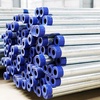Firefighting pipes are a critical component of fire protection systems, playing a pivotal role in delivering water and other extinguishing agents to fires efficiently and reliably. Selecting the right type of pipe for a fire suppression system is essential for ensuring maximum functionality and safety.
Understanding Firefighting Pipes
Firefighting pipes are specially designed to withstand high pressures and are capable of delivering large volumes of water quickly to extinguish or control fires. These pipes are part of a larger fire protection system that includes pumps, valves, sprinkler heads, and other components critical to effective fire suppression.
Types of Firefighting Pipes
-
Steel Pipes: Steel pipes are the most commonly used in fire protection systems due to their high strength and durability. They can handle high pressure and are suitable for both underground and above-ground installations.
-
Galvanized Steel Pipes: These are steel pipes coated with a layer of zinc to prevent rust and corrosion, making them ideal for use in moist environments or where the pipes are exposed to corrosive agents.
-
Copper Pipes: Known for their reliability and excellent corrosion resistance, copper pipes are often used in sprinkler systems within residential and commercial buildings.
-
CPVC (Chlorinated Polyvinyl Chloride) Pipes: CPVC pipes are plastic pipes that are light, easy to install, and resistant to corrosion. They are particularly popular in residential sprinkler systems because they are less expensive than metal pipes and do not require heavy tools for installation.
-
Ductile Iron Pipes: These pipes are made from ductile iron and are extremely strong, durable, and versatile. They are often used in large-scale industrial and municipal fire protection systems.
Factors to Consider When Choosing Firefighting Pipes
-
Pressure Requirements: Consider the pressure requirements of the fire suppression system. Pipes must be able to handle the specific pressures exerted by the firefighting pumps without bursting.
-
Environmental Conditions: Evaluate the environmental conditions where the pipes will be installed. For outdoor or underground installations, materials that resist corrosion and environmental wear are crucial.
-
Compatibility: Ensure that the pipes are compatible with other components of the fire suppression system and the type of extinguishing agents used (e.g., water, foam).
-
Installation and Maintenance: Consider the ease of installation and the maintenance required for the pipes. For example, CPVC pipes are easier to install than steel pipes but may not be as durable.
-
Cost: Budget is always a consideration. More durable materials like copper and steel can be more expensive upfront but may offer lower long-term maintenance costs.
-
Building Codes and Standards: Compliance with local fire safety codes and standards is mandatory. Check that the pipes meet or exceed the necessary specifications and approvals.
Conclusion
Choosing the right firefighting pipes is crucial for the safety and efficiency of any fire protection system. By understanding the different types of pipes available and considering factors such as pressure requirements, environmental conditions, and compatibility with other system components, you can select the most suitable pipes for your specific needs. Investing in high-quality firefighting pipes not only ensures effective fire suppression but also significantly enhances the safety of occupants and property. Remember, in fire safety, every detail counts, and the right pipes could make all the difference in an emergency.
More Read: best firefighting pipes


No comments yet